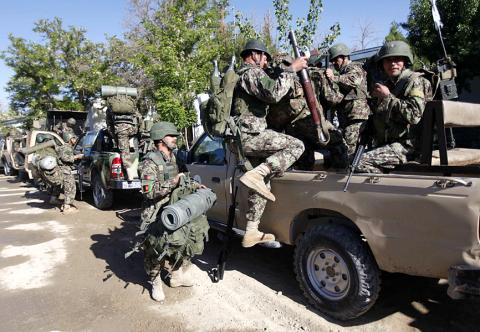US President Barack Obama and NATO allies were to focus yesterday on logistical aspects of ending the protracted Afghan war after Afghan President Hamid Karzai vowed his country would no longer be a “burden” for the international community.
Pakistani President Asif Ali Zardari’s attendance at the summit had raised hopes his government was ready to lift a blockade on NATO convoys, but talks on reopening the routes have stumbled over Islamabad’s demand to charge steep fees for trucks crossing the border.
Zardari and leaders from 30 other nations and international organizations were to join the 28 NATO allies for yesterday’s second day of talks.

Photo: Reuters
Leaders of the 28 NATO nations stood in solemn silence as a bugler’s lament recalled the heavy cost of a conflict that has killed more than 3,000 coalition soldiers, maimed thousands more and left tens of thousands of Afghans dead.
As anti-war protesters clashed with police near the Chicago summit site, the two-day talks aimed to endorse a withdrawal strategy and seek firm commitments from allies to train and bankroll Afghan forces.
Before the summit, US President Barack Obama held talks with Karzai, three weeks after his dramatic trip to Kabul where the two leaders signed a security pact for going forward after the last 130,000 international troops withdraw in late 2014.
In a sign of growing impatience within the alliance, new French President Francois Hollande refused to back down from his decision to pull troops out this year, a year earlier than planned.
“I told everyone I spoke with that this was not negotiable because it was a question of French sovereignty and everyone understood,” he said, adding that France would continue to train Afghan forces after this year.
Karzai said his country no longer wanted to be a “burden,” urging the international community to complete a security transition to his Afghan forces.
“Afghanistan ... is looking forward to an end to this war and a transformational decade in which Afghanistan will be working further for institution-building and the development of sound governance in the country,” he said.
Along with reaffirming the 2014 deadline, the summit was expected to back Obama’s plan to cede the lead in combat missions to Afghan troops next year, while making a commitment to securing US$4 billion annually for Afghan forces.
A Western official said on Sunday that nations with troops in Afghanistan had pledged roughly US$1 billion to bankroll Afghan security forces after 2014. The bulk of the funding is expected to come from the US.
In a sign of the waning appetite for further conflict, NATO Secretary-General Anders Fogh Rasmussen said the Western defense alliance “has no intention to intervene” in Syria despite concern at the bloodshed there.
The summit in Obama’s hometown went ahead under a massive security operation as normally bustling Chicago streets were deserted.
Boats with machine guns patrolled a river near Obama’s hotel and police enforced a wide security perimeter around the conference center.

The CIA has a message for Chinese government officials worried about their place in Chinese President Xi Jinping’s (習近平) government: Come work with us. The agency released two Mandarin-language videos on social media on Thursday inviting disgruntled officials to contact the CIA. The recruitment videos posted on YouTube and X racked up more than 5 million views combined in their first day. The outreach comes as CIA Director John Ratcliffe has vowed to boost the agency’s use of intelligence from human sources and its focus on China, which has recently targeted US officials with its own espionage operations. The videos are “aimed at

STEADFAST FRIEND: The bills encourage increased Taiwan-US engagement and address China’s distortion of UN Resolution 2758 to isolate Taiwan internationally The Presidential Office yesterday thanked the US House of Representatives for unanimously passing two Taiwan-related bills highlighting its solid support for Taiwan’s democracy and global participation, and for deepening bilateral relations. One of the bills, the Taiwan Assurance Implementation Act, requires the US Department of State to periodically review its guidelines for engagement with Taiwan, and report to the US Congress on the guidelines and plans to lift self-imposed limitations on US-Taiwan engagement. The other bill is the Taiwan International Solidarity Act, which clarifies that UN Resolution 2758 does not address the issue of the representation of Taiwan or its people in

US Indo-Pacific Commander Admiral Samuel Paparo on Friday expressed concern over the rate at which China is diversifying its military exercises, the Financial Times (FT) reported on Saturday. “The rates of change on the depth and breadth of their exercises is the one non-linear effect that I’ve seen in the last year that wakes me up at night or keeps me up at night,” Paparo was quoted by FT as saying while attending the annual Sedona Forum at the McCain Institute in Arizona. Paparo also expressed concern over the speed with which China was expanding its military. While the US

SHIFT: Taiwan’s better-than-expected first-quarter GDP and signs of weakness in the US have driven global capital back to emerging markets, the central bank head said The central bank yesterday blamed market speculation for the steep rise in the local currency, and urged exporters and financial institutions to stay calm and stop panic sell-offs to avoid hurting their own profitability. The nation’s top monetary policymaker said that it would step in, if necessary, to maintain order and stability in the foreign exchange market. The remarks came as the NT dollar yesterday closed up NT$0.919 to NT$30.145 against the US dollar in Taipei trading, after rising as high as NT$29.59 in intraday trading. The local currency has surged 5.85 percent against the greenback over the past two sessions, central